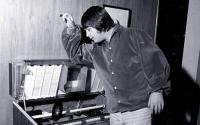Common Dreams / Published on Tuesday, July 25, 2006 by the Guardian/UK Brian Whitaker
The people of Lebanon are facing their "hour of greatest need", the UN said yesterday in launching an emergency appeal for $150m (£81m) to help an estimated 800,000 civilians whose lives have been disrupted by Israeli bombing of Lebanon.
The relief plan would focus on providing food, water, healthcare and other essential services, Jan Egeland, the UN emergency relief coordinator, said.
The situation in Lebanon is "very bad, and deteriorating by the day", said Mr Egeland. On Sunday he described the bombing of south Beirut as "a violation of humanitarian law".
But last night he had harsh words for Hizbullah as well, rebuking the Shi'ite group for cravenly using civilians as human shields. "Hizbullah must stop this cowardly blending ... among women and children," Mr Egeland said.
A UN report accompanying the appeal highlighted the scale of the devastation during 12 days of warfare, saying:
· The ongoing [Israeli] military operation has caused enormous damage to residential areas and key civilian infrastructure such as power plants, seaports and fuel depots.
· Hundreds of bridges and virtually all road networks have been systematically destroyed, leaving entire communities in the south inaccessible.
· Skyrocketing prices for basic goods (eg: the price of sugar has risen by 600% and cooking gas by 400%) further deplete the coping mechanisms of the Lebanese.
· The longer the hostilities last, the more dramatic the humanitarian situation will become. Food, water, health, fuel, and other basic needs will increase; so will the number of internally displaced persons.
· Reports indicate that there is a lack of essential goods, with needs particularly acute in villages along the Israeli-Lebanese border, which have been isolated by the conflict. There are reports that food supplies in some villages have been exhausted.
· The widespread destruction of public infrastructure ... as well as the targeting of commercial trucks, has seriously hampered relief operations.
· As many as 800 persons live in a school designed for 200 to 300 children. School water systems cannot cope with the extent of needs. Neither can sanitary facilities ... a resurgence of diarrhoea cases has been noted in some centres.
In addition to this list, Mr Egeland said there was one school housing 1,000 people which had only six toilets. He warned that fuel was becoming critical in many areas and power failure would affect water supplies and sewage, bringing increased health risks. Calling for an immediate ceasefire, he said: "Only cessation of hostilities can really make it safe for us [to deliver aid]." Failing that, the UN was hoping to arrange a "notification scheme" which would allow safe passage for humanitarian goods.
The UN already had 100 trucks contracted or on their way to deliver aid within Lebanon, Mr Egeland said. The first convoy could head south from Beirut to Sidon and Tyre as early as tomorrow, and the UN was working on details with the Israeli military, he said.
The UN is asking Israel for safe passage through three Lebanese ports. Initially, it hopes to have two ships ferrying supplies into Beirut from Cyprus, with the ports of Tripoli, in the north, and Tyre, in the south, to be added later.
It has also asked Israel to grant safe passage for convoys from Syria. Mr Egeland said the plan was to set up a staging area on the border to receive aid and prioritise it for distribution. "We are hopeful that in the course of this week you will see a real difference on the ground. By next week we will have a major operation really started," he said.
The White House said yesterday that George Bush had ordered helicopters and ships to Lebanon to give humanitarian aid. "Humanitarian supplies will start arriving in Lebanon tomorrow by helicopter and by ship," said White House spokesman Tony Snow. "We are working with Israel and Lebanon to open up humanitarian corridors." He described the move as "a significant US commitment".
Mr Bush still opposed the idea of an immediate ceasefire, he added, saying there was no reason to believe it would stop violence in the Middle East; instead the world should confront Hizbullah and its practice of using the Lebanese people as "human shields".






